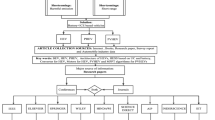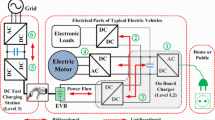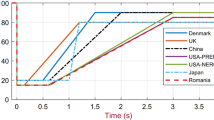Abstract
An energy management strategy (EMS) plays an important role for hybrid vehicles, as it is directly related to the power distribution between power sources and further the energy saving of the vehicles. Currently, rule-based EMSs and optimization-based EMSs are faced with the challenge when considering the optimality and the real-time performance of the control at the same time. Along with the rapid development of the artificial intelligence, learning-based EMSs have gained more and more attention recently, which are able to overcome the above challenge. A deep reinforcement learning (DRL)-based EMS is proposed for fuel cell hybrid buses (FCHBs) in this research, in which the fuel cell durability is considered and evaluated based on a fuel cell degradation model. The action space of the DRL algorithm is limited according to the efficiency characteristic of the fuel cell in order to improve the fuel economy and the Prioritized Experience Replay (PER) is adopted for improving the convergence performance of the DRL algorithm. Simulation results of the proposed DRL-based EMS for an FCHB are compared to those of a dynamic programming (DP)-based EMS and a reinforcement learning (RL)-based EMS. Comparison results show that the fuel economy of the proposed DRL-based EMS is improved by an average of 3.63% compared to the RL-based EMS, while the difference to the DP-based EMS is within an average of 5.69%. In addition, the fuel cell degradation rate is decreased by an average of 63.49% using the proposed DRL-based EMS compared to the one without considering the fuel cell durability. Furthermore, the convergence rate of the proposed DRL-based EMS is improved by an average of 30.54% compared to the one without using the PER. Finally, the adaptability of the proposed DRL-based EMS is validated on a new driving cycle, whereas the training of the DRL algorithm is completed on the other three driving cycles.













Similar content being viewed by others
References
Gao, D. W., Jin, Z. H., & Lu, Q. C. (2008). Energy management strategy based on fuzzy logic for a fuel cell hybrid bus. Journal of Power Sources, 185(1), 311–317.
Zhang, Q., Deng, W., Zhang, S., & Wu, J. (2016). A rule based energy management system of experimental battery/supercapacitor hybrid energy storage system for electric vehicles. Journal of Control Science and Engineering, 2016, 1–17.
Yan, M., Li, M., He, H., Peng, J., & Sun, C. (2018). Rule-based energy management for dual-source electric buses extracted by wavelet transform. Journal of Cleaner Production, 189, 116–127.
Lee, H. S., Kim, J. S., Park, Y. I., & Cha, S. W. (2016). Rule-based power distribution in the power train of a parallel hybrid tractor for fuel savings. International Journal of Precision Engineering and Manufacturing-Green Technology, 3(3), 231–237.
Lin, C. C., Peng, H., Grizzle, J. W., & Kang, J. M. (2003). Power management strategy for a parallel hybrid electric truck. IEEE Transactions on Control Systems Technology, 11(6), 839–849.
Kim, N. W., Cha, S. W., & Peng, H. (2011). Optimal control of hybrid electric vehicles based on Pontryagin’s minimum principle. IEEE Transactions on Control Systems Technology, 19(5), 1279–1287.
Hou, C., Ouyang, M. G., Xu, L. F., & Wang, H. W. (2014). Approximate Pontryagin’s minimum principle applied to the energy management of plug-in hybrid electric vehicles. Applied Energy, 115, 174–189.
Zheng, C. H., Kim, N. W., & Cha, S. W. (2012). Optimal control in the power management of fuel cell hybrid vehicles. International Journal of Hydrogen Energy, 37(1), 655–663.
Liu, T., Zou, Y., Liu, D., & Sun, F. (2015). Reinforcement learning of adaptive energy management with transition probability for a hybrid electric tracked vehicle. IEEE Transactions on Industrial Electronics, 62(12), 7837–7846.
Zou, Y., Liu, T., Liu, D., & Sun, F. (2016). Reinforcement learning-based real-time energy management for a hybrid tracked vehicle. Applied Energy, 171, 372–382.
Liu, T., & Hu, X. (2018). A bi-level control for energy efficiency improvement of a hybrid tracked vehicle. IEEE Transactions on Industrial Informatics, 14(4), 1616–1625.
Liu, T., Wang, B., & Yang, C. L. (2018). Online Markov chain-based energy management for a hybrid tracked vehicle with speedy Q-learning. Energy, 160, 544–555.
Du, G., Zou, Y., Zhang, X., Kong, Z., Wu, J., & He, D. (2019). Intelligent energy management for hybrid electric tracked vehicles using online reinforcement learning. Applied Energy, 251, 113388.
Liu, T., Hu, X., Hu, W., & Zou, Y. (2019). A heuristic planning reinforcement learning-based energy management for power-split plug-in hybrid electric vehicles. IEEE Transactions on Industrial Informatics, 15(12), 6436–6445.
Zhou, Q., Li, J., Shuai, B., Williams, H., He, Y., Li, Z., & Yan, F. (2019). Multi-step reinforcement learning for model-free predictive energy management of an electrified off-highway vehicle. Applied Energy, 255, 113755.
Liu, C., & Murphey, Y. L. (2019). Optimal power management based on Q-learning and neuro-dynamic programming for plug-in hybrid electric vehicles. IEEE Transactions On Neural Networks and Learning Systems, 31(6), 1942–1954.
Zhang, Q., Wu, K., & Shi, Y. (2020). Route planning and power management for PHEVs with reinforcement learning. IEEE Transactions on Vehicular Technology, 69(5), 4751–4762.
Lin, X., Zhou, B., & Xia, Y. (2020). Online recursive power management strategy based on the reinforcement learning algorithm with cosine similarity and a forgetting factor. IEEE Transactions on Industrial Electronics, 68(6), 5013–5023.
Sun, H., Fu, Z., Tao, F., Zhu, L., & Si, P. (2020). Data-driven reinforcement-learning-based hierarchical energy management strategy for fuel cell/battery/ultracapacitor hybrid electric vehicles. Journal of Power Sources, 455, 227964.
Zhang, W., Wang, J., Liu, Y., Gao, G., Liang, S., & Ma, H. (2020). Reinforcement learning-based intelligent energy management architecture for hybrid construction machinery. Applied Energy, 275, 115401.
Xiong, R., Cao, J., & Yu, Q. (2018). Reinforcement learning-based real-time power management for hybrid energy storage system in the plug-in hybrid electric vehicle. Applied Energy, 211, 538–548.
Bin, X., Dhruvang, R., Darui, Z., Adamu, Y., Xueyu, Z., Xiaoya, L., & Zoran, F. (2020). Parametric study on reinforcement learning optimized energy management strategy for a hybrid electric vehicle. Applied Energy, 259, 114200.
Wu, J., He, H., Peng, J., Li, Y., & Li, Z. (2018). Continuous reinforcement learning of energy management with deep Q network for a power split hybrid electric bus. Applied Energy, 222, 799–811.
Du, G., Zou, Y., Zhang, X., Liu, T., Wu, J., & He, D. (2020). Deep reinforcement learning based energy management for a hybrid electric vehicle. Energy, 201, 117591.
Hu, Y., Li, W., Xu, K., Zahid, T., Qin, F., & Li, C. (2018). Energy management strategy for a hybrid electric vehicle based on deep reinforcement learning. Applied Sciences, 8(2), 187.
Qi, X., Luo, Y., Guoyuan, Wu., Boriboonsomsin, K., & Barth, M. (2019). Deep reinforcement learning enabled self-learning control for energy efficient driving. Transportation Research Part C Emerging Technologies, 99, 67–81.
Tan, H., Zhang, H., Peng, J., Jiang, Z., & Wu, Y. (2019). Energy management of hybrid electric bus based on deep reinforcement learning in continuous state and action space. Energy Conversion and Management, 195, 548–560.
Li, Y., He, H., Peng, J., & Wang, H. (2019). Deep reinforcement learning-based energy management for a series hybrid electric vehicle enabled by history cumulative trip information. IEEE Transactions on Vehicular Technology, 68(8), 7416–7430.
Liu, J., Chen, Y., Zhan, J., & Shang, F. (2019). Heuristic dynamic programming based online energy management strategy for plug-in hybrid electric vehicles. IEEE Transactions on Vehicular Technology, 68(5), 4479–4493.
http://www.miit-eidc.org.cn/module/download/downfile.jsp?classid=0&filename=b68c55c7356349629d0058c32e5f3474.pdf. Accessed 19 Dec 2021.
Zheng, C. H., Oh, C. E., Park, Y. I., & Cha, S. W. (2012). Fuel economy evaluation of fuel cell hybrid vehicles based on equivalent fuel consumption. International Journal of Hydrogen Energy, 37(2), 1790–1796.
Zheng, C. H., Xu, G. Q., Park, Y. I., Lim, W. S., & Cha, S. W. (2014). Prolonging fuel cell stack lifetime based on Pontryagin’s Minimum Principle in fuel cell hybrid vehicles and its economic influence evaluation. Journal of Power Sources, 248, 533–544.
Zheng, C. H., & Cha, S. W. (2017). Real-time application of Pontryagin’s Minimum Principle to fuel cell hybrid buses based on driving characteristics of buses. International Journal of Precision Engineering and Manufacturing-Green Technology, 4(2), 199–209.
Hu, Z., Li, J., Xu, L., Song, Z., Fang, C., Ouyang, M., & Kou, G. (2016). Multi-objective energy management optimization and parameter sizing for proton exchange membrane hybrid fuel cell vehicles. Energy Conversion and Management, 129, 108–121.
Pei, P., Chang, Q., & Tang, T. (2008). A quick evaluating method for automotive fuel cell lifetime. International Journal of Hydrogen Energy, 33(14), 3829–3836.
Li, Y., He, H., Peng, J., & Wu, J. (2018). Energy management strategy for a series hybrid electric vehicle using improved deep Q-network learning algorithm with prioritized replay. DEStech Trans Environ Energy Earth Sci. https://doi.org/10.12783/dteees/iceee2018/27794
Larochelle, H., Bengio, Y., Louradour, J., & Lamblin, P. (2009). Exploring strategies for training deep neural networks. Journal of Machine Learning Research, 10(1), 1–40.
Glorot, X., Bordes, A., & Bengio, Y. (2011, June). Deep sparse rectifier neural networks. In: Proceedings of the fourteenth international conference on artificial intelligence and statistics (pp. 315–323). JMLR Workshop and Conference Proceedings.
Kulikov, I., Kozlov, A., Terenchenko, A., & Karpukhin, K. (2020). Comparative study of powertrain hybridization for heavy-duty vehicles equipped with diesel and gas engines. Energies, 13(8), 2072.
Zheng, C. H., Xu, G. Q., Park, Y. I., Lim, W. S., & Cha, S. W. (2014). Comparison of PMP and DP in fuel cell hybrid vehicles. International Journal of Automotive Technology, 15(1), 117–123.
Acknowledgements
This research was supported by Shenzhen Science and Technology Innovation Commission (Grant no. KQJSCX20180330170047681, JCYJ20210324115800002, JCYJ20180507182628567), Department of Science and Technology of Guangdong Province (Grant no. 2021A0505030056, 2021A0505050005), National Natural Science Foundation of China (Grant no. 62073311), CAS Key Laboratory of Human-Machine Intelligence-Synergy Systems, Shenzhen Pengcheng Program, and Shenzhen Key Laboratory of Electric Vehicle Powertrain Platform and Safety Technology.
Author information
Authors and Affiliations
Corresponding author
Ethics declarations
Conflict of interest
On behalf of all authors, the corresponding author states that there is no conflict of interest.
Additional information
Publisher's Note
Springer Nature remains neutral with regard to jurisdictional claims in published maps and institutional affiliations.
Rights and permissions
About this article
Cite this article
Zheng, C., Li, W., Li, W. et al. A Deep Reinforcement Learning-Based Energy Management Strategy for Fuel Cell Hybrid Buses. Int. J. of Precis. Eng. and Manuf.-Green Tech. 9, 885–897 (2022). https://doi.org/10.1007/s40684-021-00403-x
Received:
Revised:
Accepted:
Published:
Issue Date:
DOI: https://doi.org/10.1007/s40684-021-00403-x




